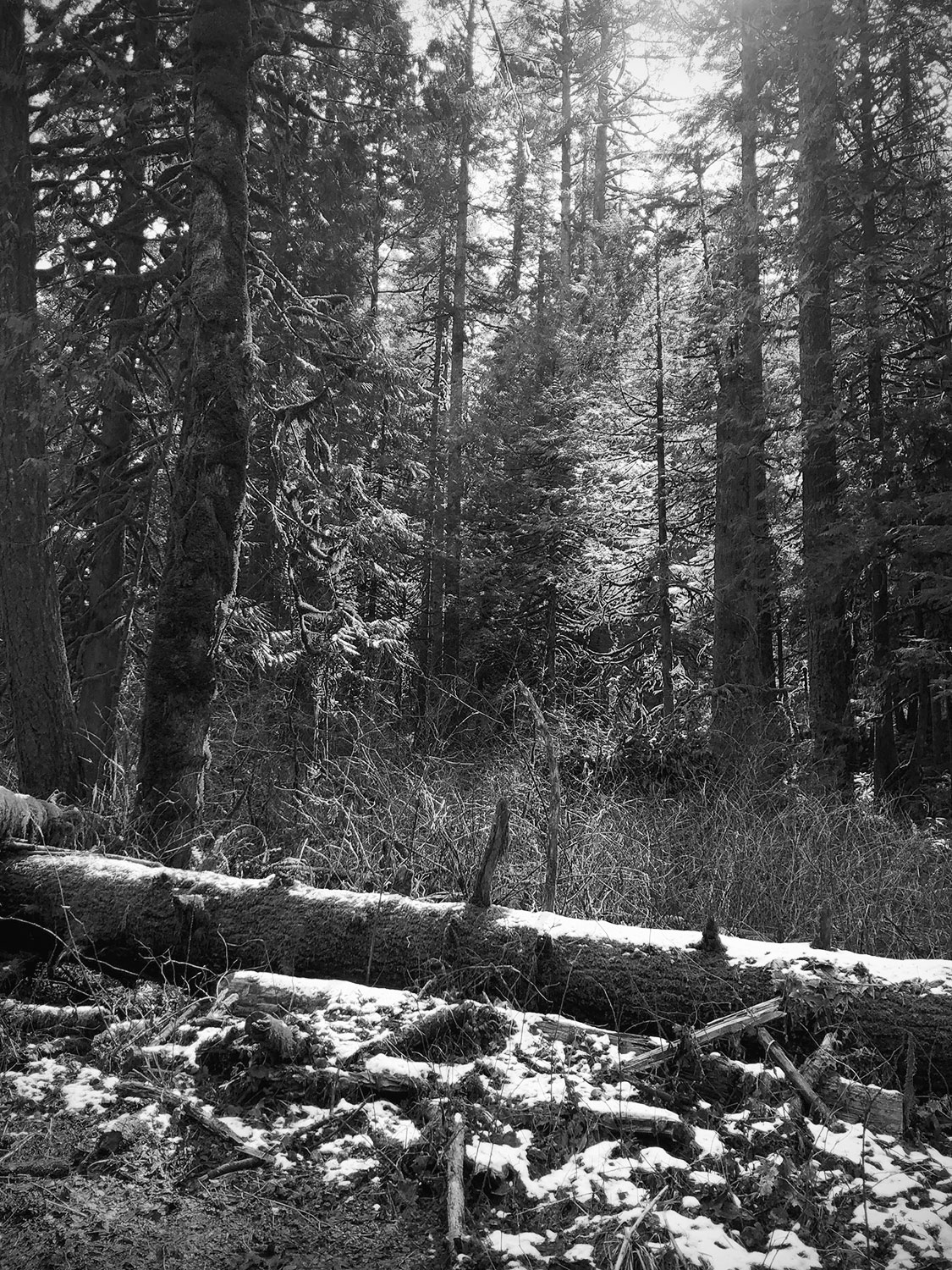March 2025
common trickeries
25 March 2025, around 14.58.

Looking out the window in the morning to see the rain and fog, although the fog may be smoke from people who still use wood stoves for heating, or it could be from the burn piles going now to clear the deadfall before fire season. Only a few trees are budding, but the moss is transitioning from its winter dullness and has become luminous beneath the weight of the water, which gathers in beads on its surface. Some mornings have seen a layer of snow, which always seems so permanent, so unending, but always seems to melt – often before noon.
Walking through the woods, everything still looks crushed, as though still feeling the weight of the white burden of the year. One would think that nothing is happening. But the streams are full and the sap is rising. No matter which way I go, there always seems to be a raven always flying ahead, unexpectedly large, at once comforting and ominous. I am, low-key, unsettled by their presence, as though passing in the shadow of some trickster god.
On the path ahead, a coyote looks back, watches me watching, then slips through the covert of salmonberry canes. I see it slink gracefully, with uncanny elegance, along the moss-carpeted trunk of a doug fir that has long since fallen across a stream. At the tree’s now-bare roots, which seem to form a tangled gate fencing in the wilderness, coyote looks at me again. Leaps into the dark.
As I walk past, I glance towards the forest. I mark the silhouette with pointed ears watching me. I walk on. At the boundary of the path, I look back. From beyond the rocks, the shadow cannot be seen. That doesn’t mean it’s gone.
Citation (80)
28 March 2025, around 4.47.
On successive days he would study Cicero side by side with Boccaccio, Virgil with Dante, and Horace with Petrarch, being curious to see and judge for himself the differences between them. And he learned how far in all three cases the Latin tongue surpasses the Italian, by reading their most cultivated writers always three times each on the following plan: the first time to grasp each composition as a whole, the second to note the transitions and the sequences of things, the third in greater detail to collect the fine turns of thought and expression, which he marked in the books themselves instead of copying them into commonplace or phrase books. This practice, he thought, would lead him to make good use of them as his needs recalled them to mind in their contexts: which is the sole measure of effective thought and expression.
Adversaria 24
31 March 2025, around 4.10.
‘I read because reading was order, harmony, the promise of a third act where everything would come together, where everything would make sense’ —Federico Falco (The Plains, trans. Jennifer Croft, p.109)
‘Crude and arrogant writers defend their works even against just criticisms and reasonable corrections; others, faint of heart perchance, fill themselves with the favorable judgments of their works, and, by reason of these, take no steps to perfect them’ —Giambattista Vico (Autobiography, trans. Max Harold Fisch and Thomas Goddard Bergin, Continuation, 1731, p. 193)
‘Triumph belongs to the attainment of maturity by growth process. Triumph does not belong to the false maturity based on a facile impersonation of an adult. Terrible facts are locked up in this statement’ —D.W. Winnicott (Playing and Reality, p. 147)
‘“Americanism” was a form of Modernism which had arisen from the American spirit upholding democracy, human progress, education uncontrolled by the Church, unfettered human reason, and the natural virtues of honor, courage and trustfulness. The heresy had been promulgated by Father Hecker…’ —David Christie-Murray (A History of Heresy, p. 197)
‘Investigators here have proceeded according to instinct, and their words do not correspond to what they have actually sensed’ —V. Propp (Morphology of the Folktale, trans. Laurence Scott, p. 6)
‘In many jobs, censorship is a perk of office; the censor will no more forgo it, even if it is quite ineffectual, than the man who is entitled to a second biscuit with his tea will forgo that, even if he dislikes biscuits’ —Brigid Brophy (‘The British Museum and Solitary Vice’, in Don’t Never Forget, p. 102)
‘Even if the whole of the occult arts are without scientific or metaphysical basis, even if they should one day turn out to be nothing more than an illusion without substance, they would still stand as very good examples of psychological aids in that lend to the individual a focus that he might not normally have. Anything that aids the individual in centering on himself, causing him to consider his frailties and enhance his potentials, cannot be considered useless’ —Charles Poncé (The Game of Wizards, p. 209)
‘…one cannot call one’s brother in the Spirit a heretic even if one disagrees with his views’ —David Christie-Murray (A History of Heresy, p. 216)
‘Among the semi-learned or pseudo-learned, the more shameless called him a fool, or in somewhat more courteous terms they said that he was obscure or eccentric and had odd ideas’ —Giambattista Vico (Autobiography, trans. Max Harold Fisch and Thomas Goddard Bergin, Continuation, 1731, p. 199f.)
